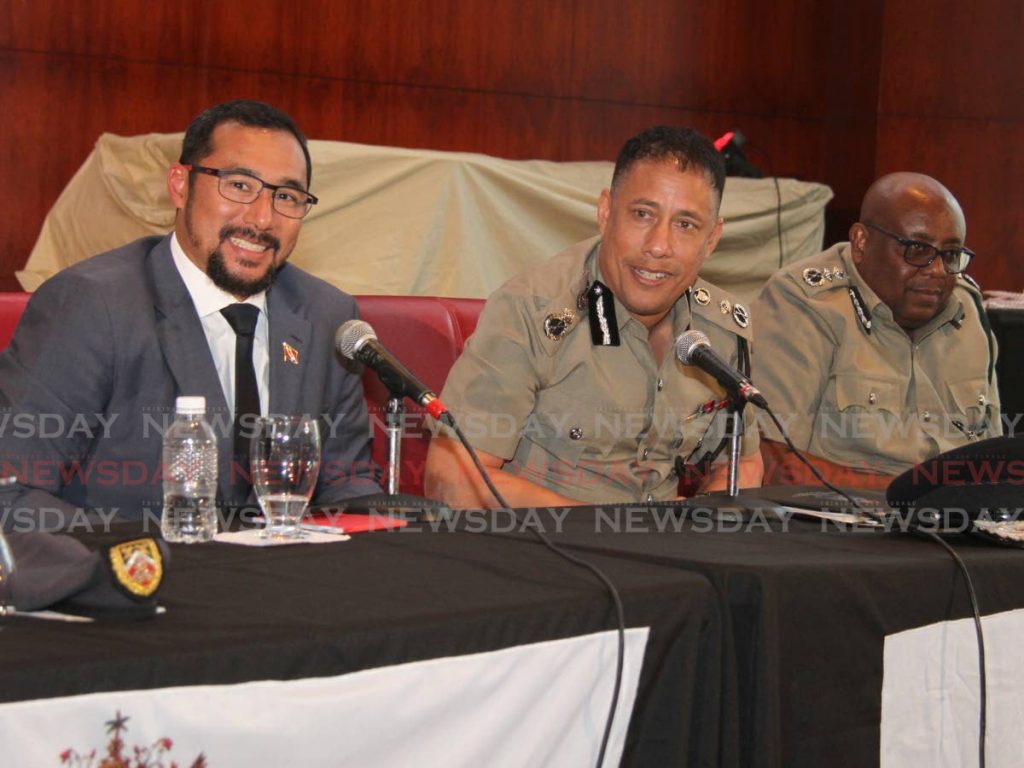Ministry, stakeholders discuss anti-crime strategy

AFTER more than three hours discussing policing and strategies to fight crime with various stakeholders including members from the private sector, schools, universities and international partners, national security members had no new insights in fighting crime.
However, the discussion reinvigorated their partnerships, as the National Security Ministry was able to hear from various stakeholders about some of the issues surrounding crime and criminality.
“It was a discussion of hard policing and softer strategies,” Minister of National Security Stuart Young said.
“I would not say there was any single point which was raised in particular that came out as a bolt out of the sky in something that is drastically new, but what we are doing is partnering with them in the various sectors to see how that partnership could be a gain for a safer and more secure TT.”
The minister spoke at a press conference after the panel discussion held at Theatre 1 at the National Academy for the Performing Arts (NAPA). He said after opening remarks were made the floor was opened and for the following two hours questions were asked of various heads of security including Commissioner of Prisons Dane Clarke, Commissioner of Police Gary Griffith, Chief of Defence Staff Daryl Daniel, Permanent Secretary of the Ministry of National Security Bel Lewis, and himself.
Young said he had a closed door policy for stakeholders which included students from CIC, QRC, students from UWI Guild, UTT and CCC, representatives from the labour union movement and members from private security firms and the hospitality industry.
He said the guests were given the privacy to speak freely, and all agreed that the approach to crime was a multi-tiered one.
“I think the unanimous view was that we all recognised that we are not where we would like to be as a society with respect to crime,” Young said.
“We are always here to listen; we are open to criticism and we want to get down to solutions.”
Young re-hashed some of the topics covered in the conversation which included the phenomenon of youths being drawn to gangs through gang culture, the illegal flow of firearms and the struggle for police officers to gather intelligence. He said there was no quick fix for crime but discussions prior to the meeting borne strategies, some of which would have short term effects and others which would bear fruit in the long term.
“Every week when we discuss how we are tackling the elements of crime and criminality that is taking place and trying to provide solutions we discuss it on a multi-dimensional level. So there would be some low hanging fruit that you would target but we also accept that there is medium-term goals. So we are tackling it on various levels and you would expect results on certain levels. So there are a lot of things being put into place.”
Griffith said some of the new policies being put in place included the use of body cameras on Emergency Response Patrol officers and mounted cameras on police vehicles, as well as non-lethal devices for police officers which include tasers and pepper spray. He said they continue to work with prison officers as well, to treat with prisoners who attempt to commit illegal acts in the prison and co-ordinate illegal acts outside prison walls.


Comments
"Ministry, stakeholders discuss anti-crime strategy"